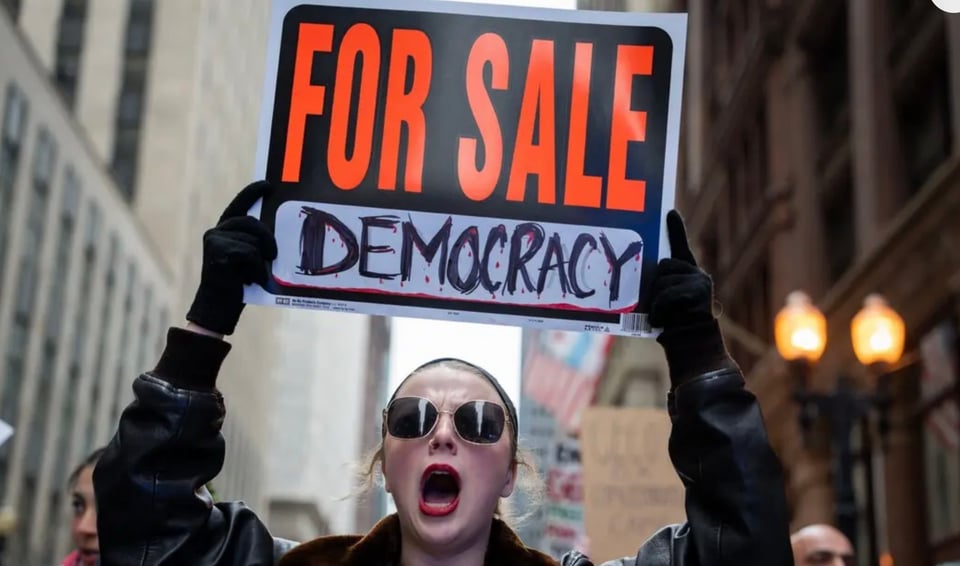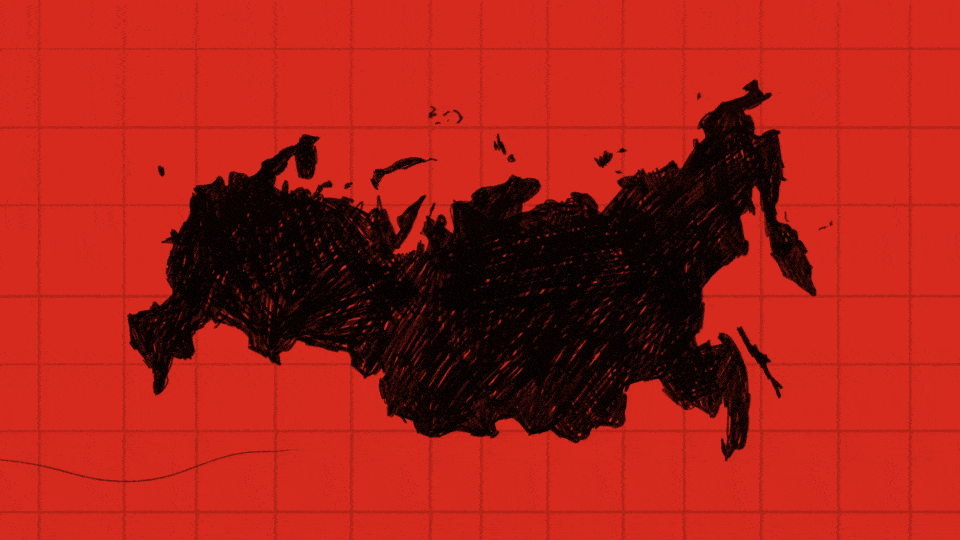Easter Sunday, April 20,2025. Annette’s Roundup for Democracy.
Eggs have gone up in price but potatoes aren’t a good answer. A new President would be.
Happy Easter to all.

Did you hear the one about Trump and Musk’s wedding?
Laughing in the Face of ‘Overwhelming Malice’ - The Atlantic
When I was in high school, my classmates and I marveled at the biting sarcasm of our Spanish teacher. (Shout-out to the peerless Señor Householder.) When someone finally asked him about his sense of humor, he attributed it to growing up during Francisco Franco’s regime: Under a repressive government, citizens gravitated to sarcastic jokes because they were a form of dissent more likely to escape official notice or punishment.
I’m not sure why that anecdote has stuck with me for so long, but as the Trump administration seeks to ban disfavored language and disappear people, it’s felt disconcertingly relevant. Although journalists have long been aficionados of black humor—working in a collapsing industry will do that to you—I’ve sensed an uptick in black humor among others in my life recently. Living in a collapsing democracy will do that to you.
“It’s a way of expressing solidarity in the face of overwhelming malice. Authoritarians depend on an appearance of inevitability, and satire and mockery at least help to undermine that, a (very) little bit,” the cartoonist Dan Perkins, better known as Tom Tomorrow, wrote to me in an email. “Satire provides an outlet, for both creator and reader—at the very least, you can laugh at the malevolent incompetence of it all.”
Laughter is also self-defense. Sigmund Freud, who knew a thing or two about collapsing societies, argued that “humor acknowledges the existence of the threatening affect and transforms it through the mechanisms … into pleasurable affect,” the psychologists Maria Christoff and Barry Dauphin write, translating Freud into (slightly) more intelligible terms.
That defense mechanism becomes more important in times of repression or chaos. In 1930s Poland, for example, Yiddish-language “joke pages” flourished. Yiddish humor “has often been characterized by a high degree of self-reflection in the form of self-irony … and read as a response to or defence against the steadily deteriorating living conditions of Jews in eastern Europe and elsewhere,” Anne-Christin Klotz and Gwen Jones wrote recently.
Sardonic jokes circulated like samizdat in Communist East Germany. One gag: “Did East Germans originate from apes? Impossible. Apes could never have survived on just two bananas a year.” And like samizdat, this humor could get you in serious trouble: 64 East Germans were imprisoned for telling political jokes. Naturally, this became fodder for meta jokes: “There are people who tell jokes. There are people who collect jokes and tell jokes. And there are people who collect people who tell jokes.”
Absurdity can seem like the only recourse in a situation where the state is, itself, absurd. After snarky Chinese social-media users noticed a striking similarity between Xi Jinping and Winnie-the-Pooh, the bear became a popular online stand-in for Xi, thus leading the government to at times censor Pooh images. (Commissars are more horrible than any heffalump could ever be.)
Authoritarian leaders are adept at using humor for their own political purposes. Stephen Gundle writes that Italian fascists “were loud, raucous and thuggish and they prided themselves on their coarse, swaggering manner.” Their laughter, he writes, “was cruel, crude and mocking.” Perhaps this sounds familiar. The television critic Emily Nussbaum wrote in 2017 that jokes were an important part of Donald Trump’s appeal and success: “His rallies boiled with rage and laughter, which were hard to tell apart. You didn’t have to think that Trump himself was funny to see this effect: I found him repulsive, and yet I could hear those comedy rhythms everywhere.” She wondered, “How do you fight an enemy who’s just kidding?”
With jokes, of course. The journalist M. Gessen wrote in 2018 about how humor can be a tool of resistance against cruel totalitarian humor. “Jokes,” they wrote, “reclaim the goodness of laughter, for regimes weaponize laughter to mock their opponents, creating what the cultural theorist Svetlana Boym called ‘totalitarian laughter.’ Its opposite is anti-totalitarian laughter.”
Unlike citizens in a democracy, not all laughter is created equal. The comedian Sarah Cooper’s impressions of Trump were wildly popular among the president’s opponents during his first term. Watching them now, I feel not so much that her videos have aged poorly but that I can’t recall why they seemed comedic in the first place. Conventional satire also seems overmatched. What room is there for hyperbole when a 19-year-old known as “Big Balls” has been rampaging through the federal government, perhaps even accessing confidential data?
By contrast, the Sweet Meteor of Death—a meme popularized in 2016 by anti-Trump conservatives who preferred a fiery end to life over either Trump or Hillary Clinton—still feels timely, perhaps because it is so bleak. Macabre jokes may also have special appeal in a moment when high-achieving knowledge workers are targets of Trump’s repression—according to some research, black humor is associated with higher levels of education.
Humor can be a defense mechanism, as Freud argued, but part of the power of the blacker variants is that they acknowledge their own limitations. “I’m sure my wry, observational wit will provide great solace to the other residents of my cell block when I’m eventually renditioned to CECOT!” Perkins told me. One hopes he’s only joking. (The Atlantic)
One more thing.
Spring, Easter eggs, laughter and tears are in the air.
This 👇 was featured in a New York Times article this week.
“You have to laugh to keep from crying,”one Republican pollster said about recent comments by billionaires on the stock market,retirement funds and Social Security
😂😂😂
And we can always count on …

Man Who Invested in Trump Shocked to be Losing Fortune.

WASHINGTON (The Borowitz Report)—A South African man who invested millions in Donald J. Trump is in a “state of shock” after losing a fortune, the man said on Monday.
“I’m still trying to process what went wrong,” he said. “If Donald Trump can’t make money, who can?”
The man said he was “baffled” that his investment had soured, given Trump’s “unparalleled track record of business success.”
“I just don’t understand how this happened,” he said. “He seemed so smart on The Apprentice.” (The Borowitz Report).
More on stopping Trump.
** In the Streets like Yesterday**
Congratulations to all who protested. 50501.
‘Shame!’ Protesters Nationwide Rally Again to Condemn Trump Policies.

New York City.

San Francisco.

Washington, DC.

Chicago.

Driggs, Idaho.
Thousands of demonstrators rallied at hundreds of events on Saturday to speak out against the president’s handling of immigration, civil liberties, job cuts and many other issues.
The turnouts in some places like Washington and Chicago appeared to be smaller than the protests on April 5. Several thousand marched in the nation’s capital on Saturday, compared with tens of thousands earlier this month.
Still, more than 700 events were planned from Jacksonville, Fla., to Los Angeles for Saturday, according to one of the organizers, the group 50501, and in New York, marchers in Midtown Manhattan filled 15 blocks on Madison Avenue.
The participants raged against the president, who they say is trampling on civil liberties and the rule of law, and overreaching in immigration, federal job cuts, the economy and other areas.
In front of the White House, protesters repeatedly shouted a single word.
“Shame!”
Thousands more marched from the Washington Monument. Many demonstrators berated the administration for not bringing Kilmar Armando Abrego Garcia, the Maryland man who the courts have said was wrongfully deported to El Salvador, back to the United States. Waving upside-down American flags, they marched along the eight-lane Constitution Avenue, chanting “Bring Kilmar home.” Trump officials have maintained that Mr. Abrego Garcia was a member of the Salvadoran gang MS-13; he denies the claim.
Julia Fine, a Maryland resident who was holding a sign at the protest by the White House that read “free Garcia,” said the prison in El Salvador where Mr. Abrego Garcia is being held reminded her of “concentration camps.”
“That’s where we’re headed with this,” she said.
Concerns over the government’s handling of Mr. Abrego Garcia’s case echoed at demonstrations from New York City to Cincinnati to Chicago.
At the protest in Manhattan, hundreds of signs flew in the air, including one that read: “Due Process.”
“It’s an injustice,” said Barry Knittle, 64, a manager at an engineering firm who lives in Mt. Kisco, N.Y. “And I fear it’s just the beginning.”
The crowd chanted, “The people united will never be defeated.” Packed double-decker tour buses passing by honked their horns in support, drawing big cheers.
Although many of the events on Saturday were traditional protests, many also were intended to unite local communities through activities such as food drives. Mass protests during President Trump’s first term, like the Women’s March in 2017, often focused on a single topic, but demonstrators on Saturday expressed concern on a wide range of issues: federal job cuts, their 401(k)s, veterans’ rights, Social Security, the war in Ukraine, transgender and gay rights, and misinformation on autism and vaccines.
“Everything here is a big issue,” said Fio Holloman, 22, who attended a rally in Chicago’s Daley Plaza.
Hundreds of protesters rallied in Fort Worth, at one point shutting down traffic for at least four blocks. Jeannie Walker, 54, couldn’t land on just one issue when asked what brought her to Saturday’s protest.
“All of it,” she said.
Aaron Burk, who attended the Washington rally and whose girlfriend took a federal buyout from the Department of Energy, said he was worried that the administration would not stop at deporting undocumented immigrants without due process and would imprison and deport U.S. citizens.
“Where does it stop?” he said. Mr. Burk added that his daughter is transgender and that he was most concerned about the dehumanization of minorities.
Hundreds took to the streets in Jacksonville, Fla., to protest a number of causes, including the president’s attacks on the L.B.G.T.Q. community and the government’s desire to alter the Endangered Species Act.
“We are losing our country,” said one demonstrator, Sara Harvey, 65. In the last few months, she said she had protested the federal job cuts led by Elon Musk and joined the nationwide protests on April 5.
I’m worried for my grandchildren,” she said. “I do it for them.”
In Cincinnati, thousands of people marched peacefully through downtown. Aftab Pureval, the mayor, led the crowd in a chant of “vote them out” and denounced the Trump administration for cutting federal workers, imposing tariffs and mismanaging the economy, saying that everything that working families need will become more expensive.
For some who attended, like Andrea Mallory, 35, a social worker, the event was akin to a group therapy session.
“This is good for us emotionally,” she said.
A celebration in Concord, Mass., to commemorate the 250th anniversary of the beginning of the American Revolution was not part of the organized network of protests, but some people took the occasion to draw parallels between then and now.
Conan Walter, 65, stood on the Old North Bridge holding a large poster scrawled with the words “Stop fascism now.”
“This celebration is about us getting out from under the King of England’s authoritarian rule,” Mr. Walter said. “That rule is trying to make a comeback today, and it’s important that people step up against that and meet the challenge.”
Still, not everyone in Concord was there to protest on Saturday. Deborah Bucknam, 78, an avid Trump supporter and lawyer from northern Vermont, said she felt shut out of the political conversation on Saturday morning. Ms. Bucknam came to Concord to honor American history, and she said political differences shouldn’t overshadow the milestone.
But she acknowledged that demonstrators were allowed to voice their dissent.
“Protests are part of the American experience,” she said. “We have a right to protest, but everyone has a right to protest.” (New York Times).
What’s Next?
How America Can Avoid Becoming Russia by Garry Kasparov.
Political pressure must be brought to bear—through the courts, the press, and the states, but also applied to legislators while they still have any power left.

Based on polls, election results, and the markets, Americans seem to be awakening, if only slowly, to the magnitude and nature of the threat they face. President Donald Trump and his allies in power are trying to erect an authoritarian Mafia state like the one Vladimir Putin and his cronies established in Russia. The American opposition talks of “undermining democracy” and “constitutional crisis”—but for the most part, its legislators, activists, and political strategists are pursuing politics as usual. They shouldn’t be.
If this sounds alarmist, forgive me for not caring. Exactly 20 years ago, I retired from professional chess to help Russia resist Putin’s budding dictatorship. People were slow to grasp what was happening there too: Putin’s bad, but surely he’ll stop short of—and you can fill in the blank with a dozen things he did to destroy Russia’s fragile democracy and civil society, many of which Trump is doing or attempting to do in America today.
Attacking the press as fake news and the enemy of the state? Check. Delegitimizing the judiciary, the last constitutional brake when the legislature is co-opted and feckless? Check. Expanding influence over the economy by threatening businesses and using tariffs to introduce a crisis and a spoils system? Check. Creating a culture of fear by persecuting unpopular individuals and groups? Been there, done all of that.
Putin is still in the Kremlin, and I’m writing this from New York City—my family has made its home there, as well as in Croatia, since we were forced to leave Russia in 2013. America’s institutions and democratic sentiment are far stronger than in the flawed, fragile state Putin took over from Boris Yeltsin 25 years ago. Russia was a mere eight years removed from Soviet totalitarianism when it elected a KGB lieutenant colonel who restored the Soviet anthem and called the fall of the U.S.S.R. the “greatest geopolitical catastrophe” of the 20th century.
Americans, by contrast, have a well-stocked toolbox with which to defend their democratic institutions, if only they would use it. The press is still free; its only limitations are self-imposed. The economy is strong, even though Trump is working hard to put a stop to that. (People who feel economically insecure, or who depend on the government for their daily bread, don’t often rise up against it. Instilling a feeling of helplessness, a lack of control, is a key ingredient of authoritarianism. For example, the uncertainty created by Trump’s tariff flip-flops are anathema to consumer and business confidence, but uncertain citizens are more likely to follow a strongman.) American federalism and the separation of powers are not trivial for a would-be autocrat to overcome. Political pressure must be brought to bear—through the courts, the press, and the states, but also applied to legislators while they still have any power left.
he american opposition should spend less time criticizing the content of the administration’s executive actions—eliciting sympathy for a deported individual, say, or decrying the impact of Trump’s tariffs on 401(k) plans—than focusing on its suspect methods. The real crisis is the lack of due process in the deportations, to take the first example, and the president’s assumption of Congress’s power to levy taxes, to take the second. Sure, Trump loves tariffs, in other words—but he mostly loves exercising power, and his slate of arbitrary levies, unilaterally imposed by the executive, is a power grab.
Never lose sight of the fact that the Trump administration’s aim is to weaken and devalue the machinery of government, on one hand, and privatize the levers of power on the other. It is accomplishing all of this at a breakneck pace. Supporting a would-be autocrat because you like his policies (say, on DEI or transgender athletes) is a terrible trap, because soon enough, your opinions and support won’t matter at all. But making opposition to the policies the centerpiece of resistance also risks missing the point. America is hurtling toward the loss of its democratic institutions and the establishment of an authoritarian state where there will be no civil discussion of these issues at all: That’s what a principled opposition must fight with its full might.
Spelling out these stakes every day, like Senator Cory Booker did in his record-breaking 25-hour speech at the beginning of the month, is vital. Call hearings, press conferences, protests—everything that can be done to draw attention to the attacks on institutions. Explain due process, and contrast it with illegal or incorrect deportations, as families are torn apart. Don’t let Elon Musk and his vandals pretend that what they are doing is about efficiency when their actions are a rounding error at best in the budget.
Here is another tactic that makes sense for political give-and-take within a democracy, but not as a means of fighting for democracy’s life: picking your battles. Senate Minority Leader Chuck Schumer may have thought he was doing exactly that when he caved to Republican pressure to pass the budget. He had a legal means of countering Trump’s autocratic agenda—rallying his party to refuse to advance the Republican spending bill—but he declined to use it. In regular democratic politics, passing on one battle to fight again another day is normal. But when fighting for democracy, you never know if there will be another day. Fight everywhere you can, always, or you will soon be as irrelevant as the Russian Duma became under Putin’s centralized executive authority.
Another recommendation: Attacking Trump’s character, however abhorrent critics may find it, is futile. The president is not acting alone. In contrast to his bumbling first term, he now has a professional script, stage managers, and a plan. Project 2025 is the product of political machinery that has sprung up around Trump that seeks to tear out the roots of American democracy and then salt the ground. To accomplish this, the Trump administration, much like Putin’s team in Russia, focuses on fear and enemies, not on constructing a brighter future. It will never be tempted to reconcile or coaxed by bipartisan outreach. So set aside the specifics of Trump’s agenda and your distaste for him as a person. Resist on every level, at every opportunity, instead of picking this or that battle. Shout from the rooftops about the attacks on process and democracy, not just the policy content.
Since trump’s inauguration, Americans have filed numerous legal complaints challenging specific cuts or orders that Musk and his so-called Department of Government Efficiency have made. After all, what authority does Musk, as a private individual, have to collect government data, decide which federal officials to fire, or allocate resources as he sees fit? Musk and Trump have turned their fire on judges who reject the legality of their actions.
Taking DOGE to court is necessary work—by all means, throw sand in the gears at every opportunity—but it’s not sufficient. That’s because Musk, like Russian oligarchs, has proximity to power, but he doesn’t actually have legal authority. To eject his influence means bringing the fight not just to him, but to the elected offices where power still resides.
Americans had probably better get used to learning Russian, so I’ll offer a political term from our lexicon: понятие, ponyatie (pon-YAH-tee-yeh), which doesn’t quite have an English equivalent but can be translated roughly as “an understanding.” The understanding of most citizens is that proximity to power is itself a form of power, that “we all know who is really calling the shots.” What we are seeing with DOGE is an example of this phenomenon—the ponyatie that Musk, as a rich man who exercises great influence over Trump, wields tremendous governmental authority despite not having an official title or a constitutional role. The ponyatie that state power can be marshaled against his critics and rivals, while he is immune to it himself. Acquiescence to that kind of thinking must be stopped before it is allowed to permeate the American political system.
To that end, Americans should invest their time and money fighting in the arena where political power still lies: with the American people and in Washington, D.C., with the handful of Republican representatives who could put a stop to the power grab. Go after the weakest links and call them out. Promise to support them against Musk’s threats to fund primary challenges if they defy him—and to raise millions against them if they don’t. Don’t give up on the levers of political power prematurely. Use them, or they will disappear, and marching in the street will be the only recourse—one that I can tell you from painful personal experience doesn’t always work out.
The trump administration has been cunning in choosing its first targets. Deporting supposed gang members and Hamas supporters without due process may violate any number of statutes, but forcing oppositionists to defend these people’s rights allows the administration to paint them as defending their ideas. Not every battle will be as favorable as standing up for cancer research or veterans’ benefits.
This is why the resistance must center the principles at stake. Does America have rule of law or not? The first line in defense of an incipient police state is: “You don’t have anything to fear if you’ve done nothing wrong.” This fallacy is soon replaced by: “It could happen to anybody,” as the regime sees the value of using arbitrary persecution to spread fear. Again, fear is the autocrat’s goal, as is simply doing many things every day. Even if you don’t like him or his policies, the longer he is there, doing things, the more the autocrat starts to feel inevitable, like the sun rising each morning.
In politics, as in physics, force is mass times acceleration. The administration is mounting a barrage of attacks, with great urgency, to break through the resistance of American legal structures, sometimes by using legal and relatively popular policies (deporting convicted criminals, for example) as cover for likely illegal and relatively unpopular policies (deporting immigrants without due process). The fabricated urgency is a tell: No war, no terrible crisis, compels the president to violate the Constitution. But the administration is breaking down norms and setting precedents faster than judges can stop it. Of course, ignoring judges is also part of the plan.
To fight this onslaught means staying focused. Skip the culture wars, where the ground can easily tilt to favor the MAGA faithful. Concentrate instead on defending American rights and values against billionaires and autocrats who want to take them away. Just because you can’t compete with Trump on populism doesn’t mean you can’t be popular, and polls already suggest that the public believes the president should obey court orders and give Ukraine more aid.
The opposition needs to proudly defend the value system and ingenious framework that made this country great. This may sound corny to cynical Americans who have taken democracy for granted for most of their lives, but it matters. The leaders of the resistance, if such can be found, must serve as spokespeople and examples of these values and institutions if they are to provide a genuine counter to Trumpism.
Rallying to the defense of American constitutional democracy has become alarmingly difficult after years of insistence, from both the far left and the far right, that the system is irreparably broken. The good news is that Trump and Musk may be reminding Americans about what they stand to lose, and to whom, as was evident in the gloating response of Democrats to the Wisconsin Supreme Court election, which Musk’s preferred candidate lost.
Americans can just look to their leaders’ avowed models should they wonder whether things could be worse. The GOP has moved so far to the right that it’s ideologically aligned with Turkey and Russia. The Trump administration’s refusal to criticize Putin may well owe to its hopes to emulate him, much as Putin’s rehabilitation of Stalin’s legacy tracked with policies that duplicated the Soviet dictator’s. And Musk has expressed admiration for Xi Jinping’s China, a repressive one-party state where he has business interests.
Four votes in the Senate. Three votes in the House. That’s all it takes. Find the weakest links. Go after them, democratically. Fundraise for them if they stand up, or against them if they don’t. The two-party system in America right now is Traitors versus Losers. Playing to win means asking every red-state legislator if they are fine with being in the Traitor Caucus. (The Atlantic.)